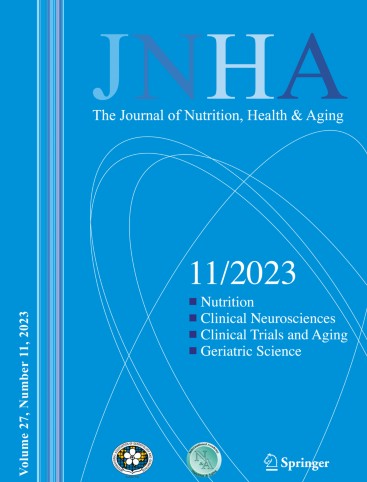The association between the MIND diet and cognitive health in middle-aged and older adults: A systematic review
IF 4
3区 医学
Q1 GERIATRICS & GERONTOLOGY
引用次数: 0
Abstract
Background
Cognitive decline, a natural aspect of aging, is linked to negative outcomes like increased mortality and social isolation. The Mediterranean-DASH Intervention for Neurodegenerative Delay (MIND) diet, blending the Mediterranean diet and the Dietary Approaches to Stop Hypertension (DASH) diet elements, aims to slow cognitive decline and reduce dementia risk. Secondary analyses of population studies and randomized controlled trials (RCTs) show mixed results on the MIND diet's effectiveness in improving cognitive health. Existing reviews have explored the MIND diet's impact on cognitive health, though their focus can be broad or narrow. Our review offers an updated perspective by specifically targeting dementia risk and clinical cognitive function, integrating new studies for enhanced insights into clinical practice and research.
Methods
This review followed the Preferred Reporting Items for Systematic Reviews and Meta-Analyses (PRISMA) 2020 and the Synthesis Without Meta-analysis (SWiM) guidelines and was registered in PROSPERO (CRD42023391972). We included quantitative studies on middle-aged and older adults (mean age >40 years) examining MIND diet adherence and cognitive health, excluding non-original research. A systematic search was conducted in five databases from March 2023 to March 2024 using relevant search terms. Data were extracted and assessed for bias by multiple reviewers using Joanna Briggs Institute (JBI) tools. Heterogeneous data were synthesized using SWiM guidelines, focusing on cognitive function outcomes, with results presented in tables and figures.
Results
The search over five databases identified 898 articles, with 26 meeting the inclusion criteria. A hand search added 13 more, totaling 39 articles from 14 countries, including cohorts, cross-sectional, RCTs, and case-control studies. Most studies were conducted in the United States of America (USA), published between 2015 and 2024. Participant numbers ranged from 37 to 120,661, with follow-ups from 3 months to 24 years. Some studies explored more than one correlation. Of the studies, 14 out of 19 articles explored MIND diet adherence and global cognitive function, showing positive results. 10 out of 11 studies investigated MIND diet adherence and dementia/Alzheimer’s risk, showing positive associations. 16 out of 18 articles examined the MIND diet's effect on domain-specific cognitive functions, with favorable outcomes.
Discussion
This systematic review reveals the significant promise of the MIND diet in enhancing cognitive health, specifically in global cognition, memory, and executive function. While observational studies strongly advocate for its inclusion in clinical guidelines to prevent and manage Alzheimer's disease (AD) and dementia, results from RCTs are mixed, suggesting further investigation is needed. The use of PRISMA and SWiM guidelines ensures robust and transparent findings, categorizing cognitive outcomes into critical areas for a holistic insight. Despite the effectiveness of alternative methods, such as MIND diet questionnaires, for adherence assessment apart from FFQ, variability in study populations, interventions, and scoring methods complicates pinpointing an optimal MIND score. This underscores the importance of standardized methodologies to refine dietary recommendations and consolidate the diet's cognitive health benefits across various populations.
MIND饮食与中老年人认知健康的关系:一项系统综述
认知能力下降是衰老的一个自然现象,与死亡率上升和社会孤立等负面结果有关。地中海-DASH干预神经退行性延迟(MIND)饮食,将地中海饮食和饮食方法停止高血压(DASH)饮食元素相结合,旨在减缓认知能力下降并降低痴呆风险。对人口研究和随机对照试验(rct)的二次分析显示,MIND饮食在改善认知健康方面的效果好坏参半。现有的评论已经探讨了MIND饮食对认知健康的影响,尽管他们的关注点可能是广泛的,也可能是狭隘的。我们的综述提供了一个新的视角,专门针对痴呆风险和临床认知功能,整合新的研究,以增强对临床实践和研究的见解。方法本综述遵循系统评价和荟萃分析首选报告项目(PRISMA) 2020和无荟萃分析综合(SWiM)指南,并在PROSPERO注册(CRD42023391972)。我们纳入了对中老年人(平均年龄40岁)的定量研究,检查了MIND饮食依从性和认知健康,排除了非原创性研究。在2023年3月至2024年3月期间,利用相关检索词对5个数据库进行系统检索。多名审稿人使用乔安娜布里格斯研究所(JBI)工具提取数据并评估偏倚。采用SWiM指南综合异构数据,重点关注认知功能结果,结果以表格和图表的形式呈现。结果在5个数据库中检索到898篇文献,其中26篇符合纳入标准。手工检索又增加了13篇,共计来自14个国家的39篇文章,包括队列、横断面、随机对照试验和病例对照研究。大多数研究是在美国进行的,发表于2015年至2024年之间。参与者人数从37到120,661不等,随访时间从3个月到24年不等。一些研究探索了不止一种相关性。在这些研究中,19篇文章中有14篇探讨了MIND饮食的坚持和全球认知功能,显示出积极的结果。11项研究中有10项调查了MIND饮食依从性和痴呆症/阿尔茨海默氏症的风险,显示出正相关。18篇文章中有16篇研究了MIND饮食对特定领域认知功能的影响,结果都很好。本系统综述揭示了MIND饮食在增强认知健康方面的重要前景,特别是在整体认知、记忆和执行功能方面。虽然观察性研究强烈主张将其纳入预防和管理阿尔茨海默病(AD)和痴呆症的临床指南,但随机对照试验的结果好坏参半,表明需要进一步研究。PRISMA和SWiM指南的使用确保了强有力和透明的研究结果,将认知结果分类到关键领域,以获得全面的见解。尽管除了FFQ之外,MIND饮食问卷等替代方法对依从性评估也很有效,但研究人群、干预措施和评分方法的可变性使确定最佳MIND评分变得复杂。这强调了标准化方法对完善饮食建议和巩固饮食对不同人群认知健康益处的重要性。
本文章由计算机程序翻译,如有差异,请以英文原文为准。
求助全文
约1分钟内获得全文
求助全文
来源期刊
CiteScore
7.80
自引率
3.40%
发文量
136
审稿时长
4-8 weeks
期刊介绍:
There is increasing scientific and clinical interest in the interactions of nutrition and health as part of the aging process. This interest is due to the important role that nutrition plays throughout the life span. This role affects the growth and development of the body during childhood, affects the risk of acute and chronic diseases, the maintenance of physiological processes and the biological process of aging. A major aim of "The Journal of Nutrition, Health & Aging" is to contribute to the improvement of knowledge regarding the relationships between nutrition and the aging process from birth to old age.

 求助内容:
求助内容: 应助结果提醒方式:
应助结果提醒方式:


